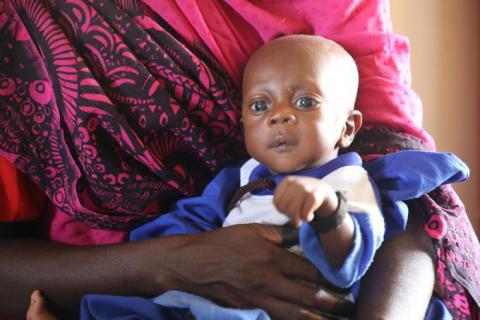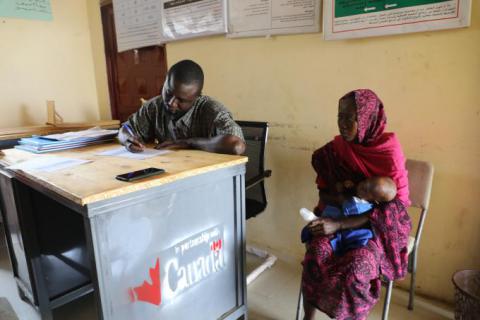Muzammil's mother finds the nutrition awareness and support

Case Study: Muzammil, is a four-month-old boy suffering from acute malnutrition. When he first came to the nutrition centre supported by Save the Children with funding from the Canadian government, his weight was only 2.9 kg at a height of 52 cm.
In Blue Nile state, Sudan, a complex set of drivers, including armed conflict, inflation, sky-rocketing food prices and misinformation are leading to high malnutrition rates amongst children under five (nearly 8% global acute malnutrition). The situation across the country is similarly dire: currently nearly a quarter of the Sudanese population, 11.7 million people, do not have sufficient access to food (HRP, 2023).
However, in Muzammil’s case, a lack of knowledge and a tragic family history further aggravated the situation: His mother Rashida, 26-year-old, sadly lost five of her children during infancy. Living in a remote area and on a minimal family income, she was not able to take her children to a hospital. Rashida still does not know why her children passed away. Left without an explanation, she assumed that her breastmilk must be ‘poisonous’. She then asked her sister to breast feed her son Muzammil alongside her own infant, yet both children’s health declined drastically.
In a turn of events, Rashida learnt about the health and nutrition centre, where she could find nutrition support for free. When she brought Muzammil to the centre, the trained staff discussed with her the benefits of breastmilk for infants, including the transfer of immunity from the mother to the child through the breastmilk. She was also introduced to a peer-to-peer support group with other mothers. Rashida became convinced that her breastmilk had not been the reason for her children’s tragic fate. She started to feed Muzammil again and his health steadily improved.
Altaher, 33, a nutrition staff in the centre stresses the importance of teaching mothers about infant and young children feeding practices. “There are a lot of misbeliefs being shared. We organise regular mother-to-mother groups, where women can learn about good feeding practices. Also, we explain how to protect children from harm, for example to avoid water sources, which could be contaminated.”
Next to feeding practices, the armed conflict in 2022 has taken a high toll on children’s health in the state. Altaher recalls: “There has been a significant increase in the frequency of children coming to the centre due to the large-scale displacement of the population. People can no longer access their land to grow their own food and often they do not have enough income to purchase sufficient food from the market. Many just buy the cheapest option to fill their stomachs.”
Malnutrition in children does not only put them at risk of survival, but also impacts on their long-term cognitive and physical development. Children might not develop to their full height or full intellectual ability due to malnourishment, putting generations at risk.
The conflict in Blue Nile also affected staff at the centre directly as Altaher recalls:” We lost most of our employees because of the conflict, many fled because of the insecurity. This put a lot of strain on the centre as we did not have enough staff to take care of all the children coming in for nutrition support.
Responding to the emergency, Save the Children trained volunteers to fill the gaps in the centre’s staffing. Altaher says: “Without the support of these volunteers, it would have been impossible to continue operating at the level required to provide basic nutrition support for children.”
The situation in Blue Nile remains fragile, even though the conflict has calmed down. Meanwhile, Save the Children, together with its national partner Aafaaq for Peace and Development Organization, continues to support the most vulnerable populations in the state.
Through the generous funding of the Global Affairs Canada for this project, 11,694 people in Blue Nile will benefit directly from nutrition and health related support, including the provision of therapeutic food, trainings, and peer-to-peer support groups among other interventions.
 Sudan
Sudan 
